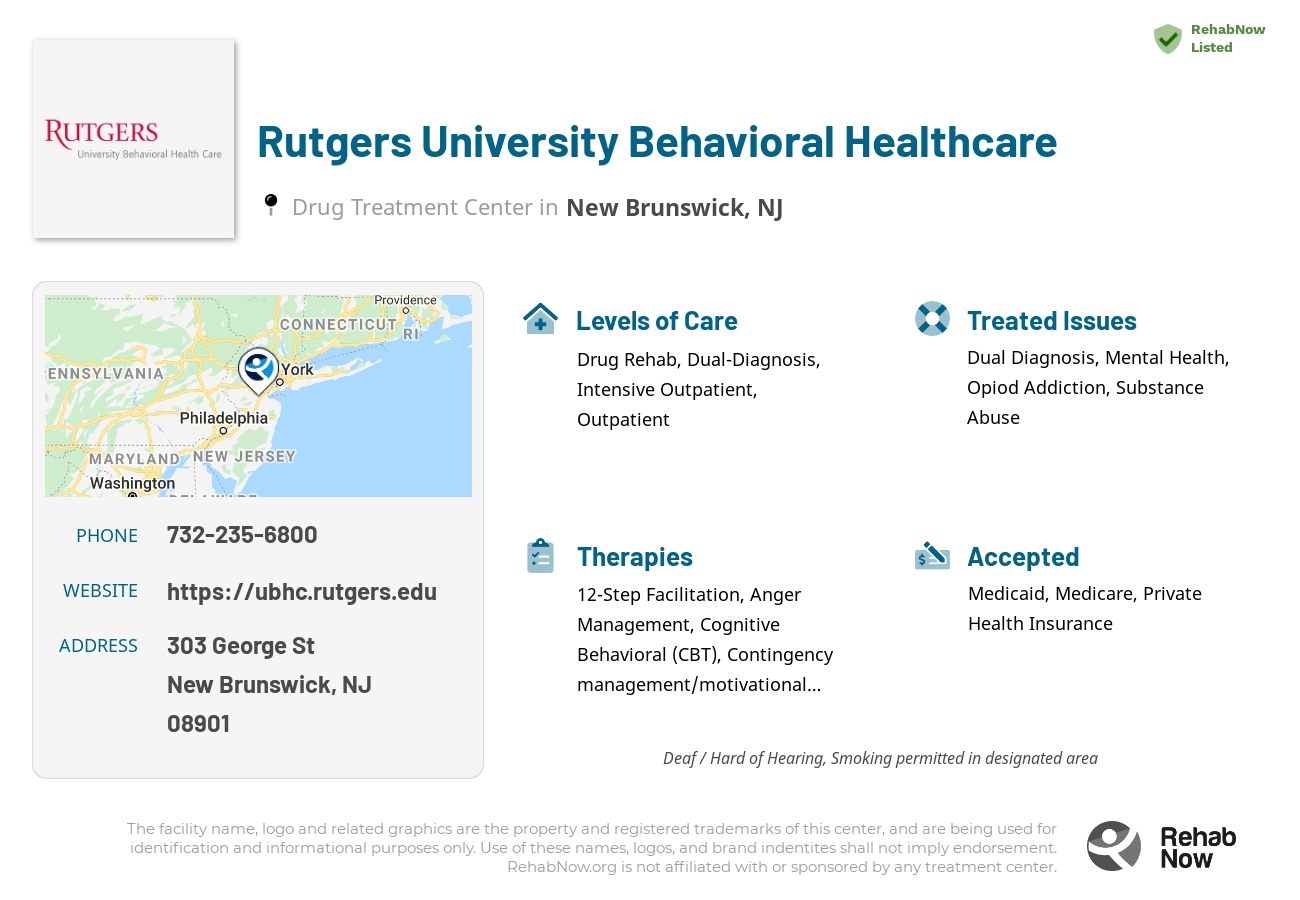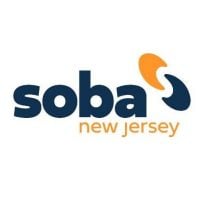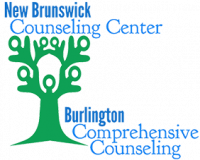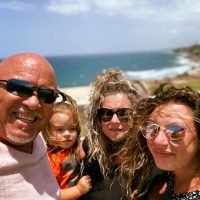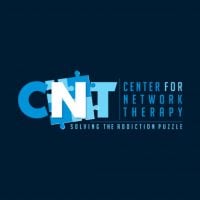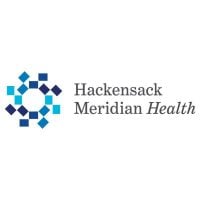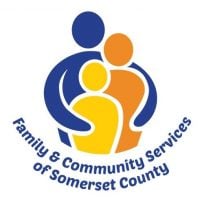Rutgers University Behavioral Healthcare
Drug Rehab Center in New Brunswick, New Jersey
Rutgers University Behavioral Healthcare is an addiction treatment facility in New Brunswick, NJ that provides comprehensive, evidence-based programs tailored to individuals struggling with opioid addiction, substance abuse, drug addiction, mental health issues, or dual diagnosis, with coverage options for those with private health insurance or self-pay.
About This New Brunswick, NJ Facility
Rutgers University Behavioral Healthcare in New Brunswick, New Jersey is a treatment facility that aims to assist individuals seeking recovery from opioid addiction, substance abuse, drug addiction, mental health issues, and dual diagnosis. With a location on the campus of Rutgers University, this center offers convenient access to various levels of care for those looking to overcome their struggles and find sobriety. The facility accepts private health insurance which may provide financial assistance for individuals seeking treatment.
At Rutgers University Behavioral Healthcare, individuals struggling with addiction and substance abuse can expect a range of services and treatment methods designed to support their recovery journey. The center offers drug rehab programs that provide intensive outpatient and outpatient options tailored to meet each person's unique needs. Additionally, they specialize in offering dual-diagnosis treatment where mental health issues are addressed alongside the addiction or substance abuse problems. These comprehensive approaches ensure that clients receive personalized care aimed at addressing all aspects of their well-being during their recovery process.
Genders
Ages
Modality
Additional
Conditions and Issues Treated
Rehab centers exist in New Brunswick, NJ to help individuals bounce back from substance abuse, which is an umbrella term for drug and alcohol addiction. Drug addiction refers to the use of illegal drugs and improper use of prescription drugs. Centers like Rutgers University Behavioral Healthcare provide individuals a chance to access individual and group therapy that can be monumental for recovery.
Substance abuse includes all problems that stem out from using various psychoactive substances. It is also a diagnostic term used by Diagnostic and Statistical Manual of Mental Disorders (DSM-IV) to define the mental and physical impairment or distress caused by misuse and overuse of certain substances in a period of 12 months.
Opioid addiction involves addiction to legal or illegal opioids. It may happen very quickly with any opioid use. Sometimes within a matter of days. Opioid addiction is a known as a high-risk factor for future heroin addiction.
Opioid withdrawal can be extremely uncomfortable and lead the user to continue to use even if they want to quit. Stopping using an opioid requires careful medical observation. Sometimes the withdrawal can persist for many weeks, which can put the user at a high risk for relapse.
It is recommended to receive inpatient treatment and a medically supervised detox like those offered at Rutgers University Behavioral Healthcare in New Brunswick, NJ, NJ, to manage the withdrawal process while learning lasting tools to maintain recovery. In some circumstances medications can be used to manage opioid addiction.
People with dual diagnosis have coexisting addiction and a mental disorder. 9.2 million US adults had a co-occurring disorder in 2018, so not just limited to New Jersey residents. Best treatment combines medication, psychotherapy (talk therapy), support group, and inpatient rehabilitation. Sometimes, complementary therapies – yoga, massage, and acupuncture – may also be used.
Levels of Care Offered
This center offers a variety of custom treatment tailored to individual recovery. Currently available are Drug Rehab, Dual-Diagnosis, Intensive Outpatient, Outpatient, with additional therapies available as listed below.
Intensive outpatient programs mostly conduct meetings on weekdays. Group therapy is the main element in most intensive outpatient programs. Most IOPs last for about 90 days and include drug use monitoring and testing. A New Jersey IOP, like what’s offerd at Rutgers University Behavioral Healthcare, take much more time than a standard outpatient program. Some programs offer other services as well, such as employment assistance and medication management.
Outpatient treatment can be considered the lowest intensity level of addiction treatment in New Brunswick, NJ. It is ideal for early phase addiction or lower intensity addictions. Rutgers University Behavioral Healthcare peer group support, 12-step programs, and individual counseling may still be involved.
Rutgers University Behavioral Healthcare‘s Therapies & Programs
Individual therapy aims to identify the core issues that would have led the patient to substance abuse and address the root cause effectively. Patients find the therapist as a person who they can trust. It helps them to open up and discuss personal and sensitive issues, which they may not be comfortable discussing in a group.
Couples therapy is an approach wherein the patients and their partners are engaged together as a part of the treatment process. When a person becomes a victim of substance abuse, it affects the patient and the people around him, particularly his partner. Their relationship can become strained due to lack of communication, financial issues, loss of trust, lack of intimacy, and physical abuse in more severe cases.
Couples therapy addresses these issues and tries to rebuild the trust between the partners. The partner’s involvement in the process will result in greater chances of treatment success and sustained recovery.
Family therapy is a set of therapeutic approaches that assumes that the entire family is a system. It utilizes the strengths and resources of the family to help the patient refrain from resorting to substance abuse. It helps to repair relationships and improve communication between family members.
Group therapy happens at Rutgers University Behavioral Healthcare in a controlled group environment, as opposed to a one-on-one setting. It supports New Brunswick, NJ patients’ recovery by offering a sense of comfort and letting them know that they are not alone. Through shared conversations, patients also learn to develop faith and understanding and gain insight on their addictions.
Unresolved trauma is often a key reason why many patients resorted to substance abuse. Trauma therapy refers to treatment wherein specialist therapists help the patients to resolve the trauma that led the patients to substance abuse. The trauma could be physical abuse, sexual abuse, war, natural disasters, divorce, accident, loss of a loved one, etc. Thinking of these traumatic events causes emotional disturbances like anxiety, depression and results in addiction. If trauma is the primary cause of substance abuse, then both issues must be addressed. Otherwise, there is a risk of relapse. Trauma therapy also improves the cognitive functions and provides long term benefits.
Dialectical Behavior Therapy (DBT) is an improved version of Cognitive Behavioral Therapy (CBT). DBT is a treatment of choice for people suffering from self-harming behaviors characterized by cutting and suicidal thoughts or inclinations.
This treatment is developed to help individuals recognize their thought patterns, behaviors, and feelings. It has demonstrated its effectiveness for people that are finding it difficult to control their emotions and urges. Conditions such as obsessive-compulsive disorder and borderline personality disorder also benefit from DBT as it imparts individuals stress-management techniques and enhanced self-esteem so they can sustain their sobriety by reducing the impact of triggers and out-of-control emotions.
Cognitive behavioral therapy (CBT) is a way of addressing concerns through talking. It can be used in individual counseling sessions. Talking through issues with professionals at Rutgers University Behavioral Healthcare can identify sources of discomfort or unhealthy thoughts. It is a way of learning about yourself and your individual perceptions. CBT is a healthy way of addressing some behaviors which may be bringing unintended consequences in your life.
Contingency management is a way to help motivate someone to remain substance free. It is a process of rewarding positive choices and good outcomes. As humans we are wired to recreate experiences that lead to positive feelings. Through this method incentives are used for completing positive steps towards a sober life. This may be a reward for attending meetings, remaining sober or for employment goals.
Payment Options Accepted
For specific insurance or payment methods please contact us.
Is your insurance accepted?
Ask an expert, call (888) 674-0062
Additional Details
Specifics, location, and helpful extra information.
New Brunswick, New Jersey 8901 Phone Number(732) 235-6800 Meta DetailsUpdated November 25, 2023
Staff Verified
What else do people call Rutgers University Behavioral Healthcare?
People have occasionally also searched for “Rutgers - UBHC in New Jersey”
Patient Reviews
There are no reviews yet. Be the first one to write one.
New Brunswick, New Jersey Addiction Information
The state of New Jersey is afflicted by the rising opioid overdose crisis and the increase in the number of residents engaging in illegal substance abuse. 90% of the 2,900 drug overdose deaths in New Jersey involved opioids in 2018. Over 1.1 million New Jersey residents reportedly use drugs in a given year. High prevalence of drug and alcohol abuse caused 14% of all deaths in the state between 2008 and 2017.
About 18% of New Brunswick residents have abused drugs or alcohol in their lifetime. Heroin and opioid abuse is a major problem in New Brunswick, with over 1,600 cases reported in 2016. Some of the impacts include increased crime rates, violence, and disease spread. The best way to find a helpful drug rehab center for you is to speak with someone who has been through the process before making any decisions.
Treatment in Nearby Cities
- Edison, NJ (2.4 mi.)
- Burlington, NJ (36.7 mi.)
- Manahawkin, NJ (56.0 mi.)
- Springfield, NJ (15.8 mi.)
- Haskell, NJ (38.0 mi.)
Centers near Rutgers University Behavioral Healthcare
The facility name, logo and brand are the property and registered trademarks of Rutgers University Behavioral Healthcare, and are being used for identification and informational purposes only. Use of these names, logos and brands shall not imply endorsement. RehabNow.org is not affiliated with or sponsored by Rutgers University Behavioral Healthcare.


